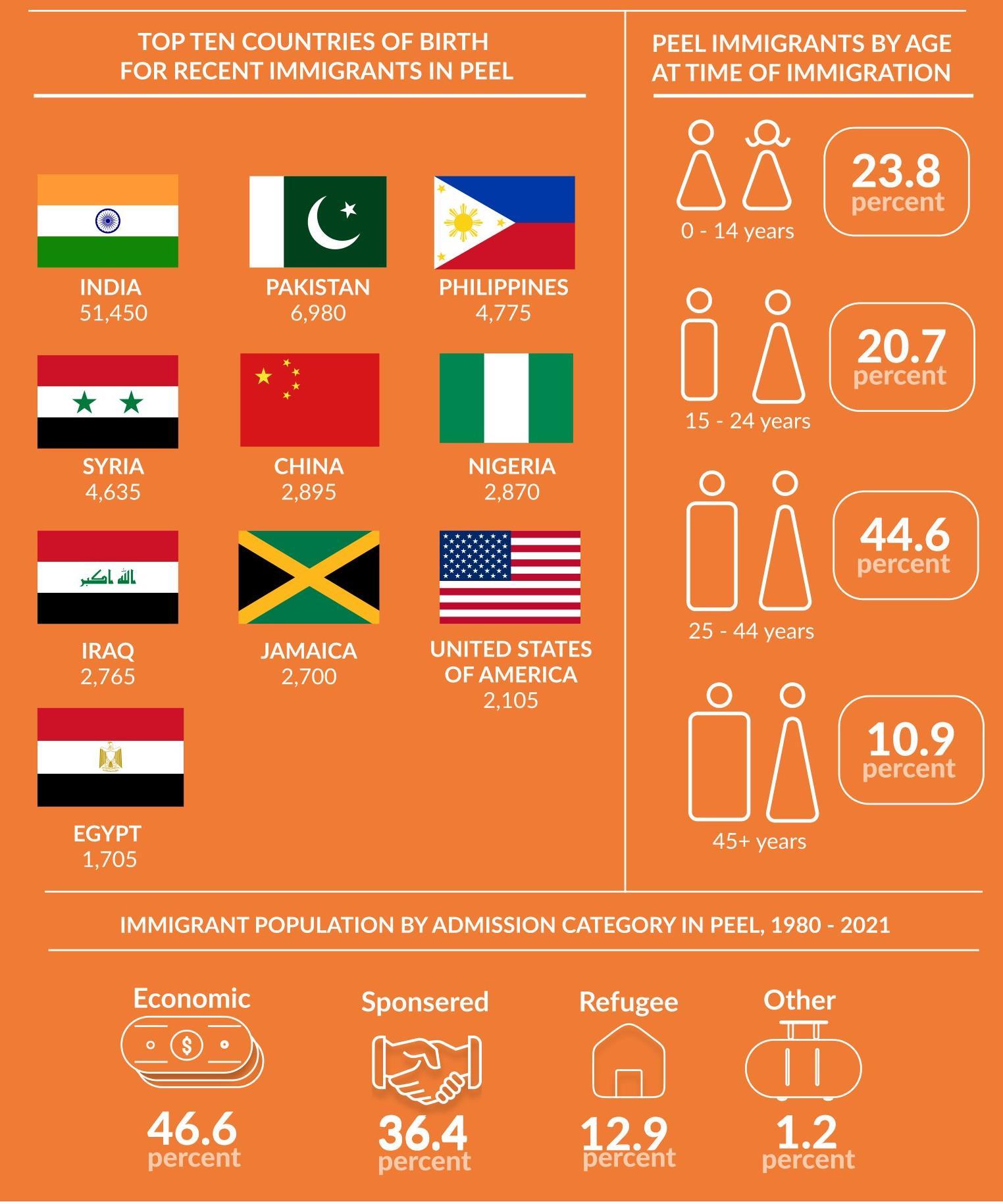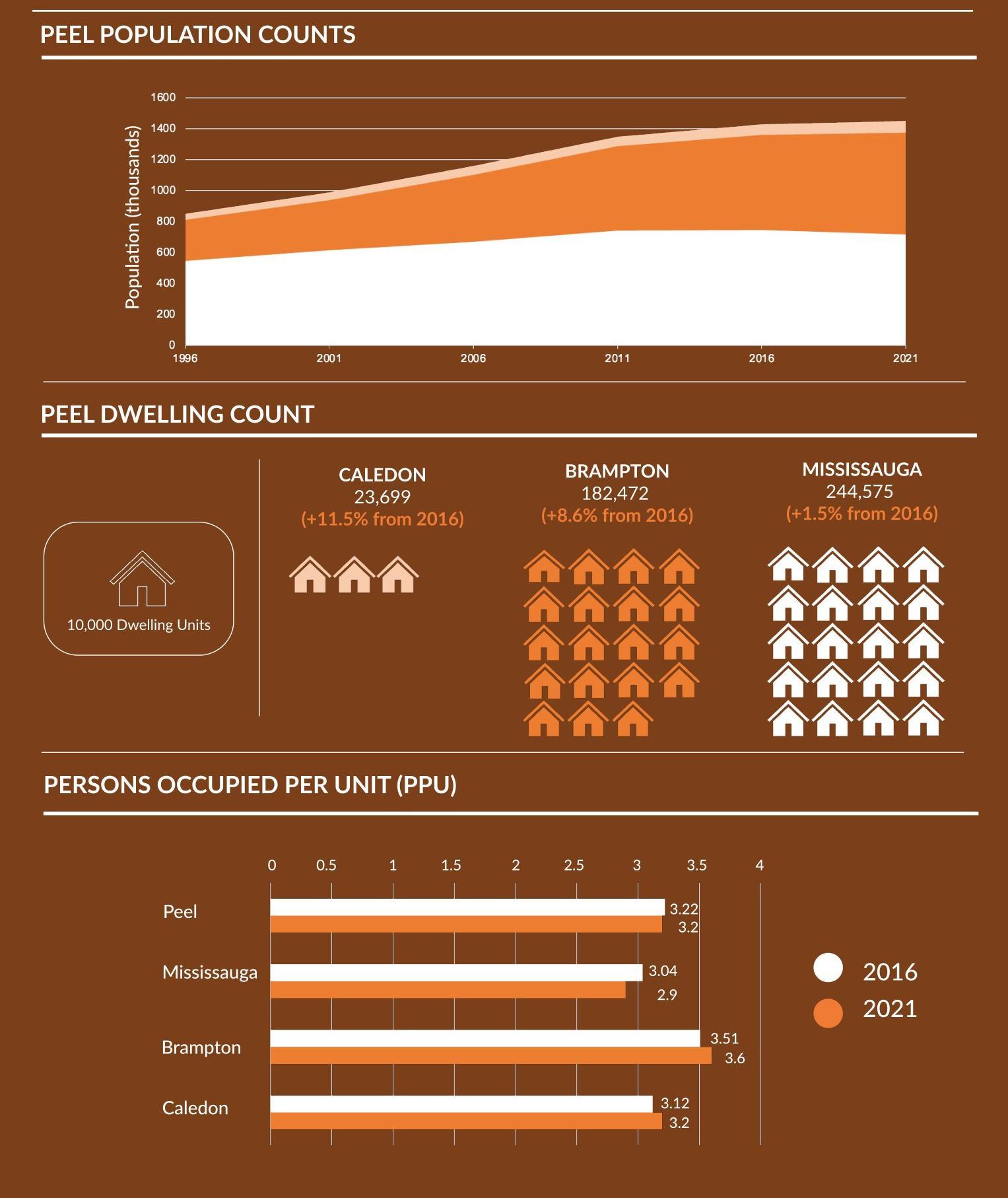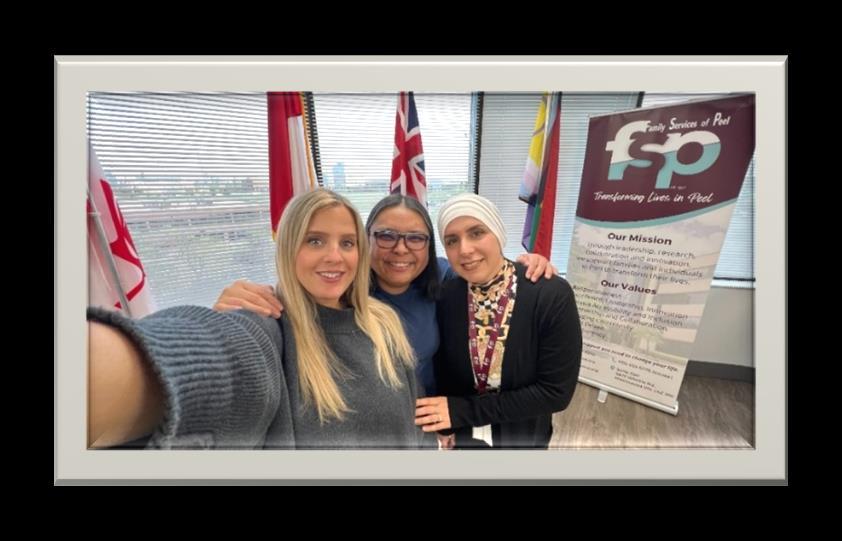Access The Support You Need To Change Your Life










Welcome to Spring and the May edition of our agency newsletter There are many changes underway at Family Services of Peel (FSP), including construction. I appreciate how our staff responded, showing team spirit as they continue to adjust and increase their resources to provide quality services to their clients and our community. Thank you for your ongoing commitment to FSP and the work we do.
In this newsletter, we are paying attention to our position statements on truth and reconciliation, antiracism, poverty reduction, and housing in the Region of Peel. Infographics on immigration and ethnic diversity, labour, education, mobility, population and dwelling, and marriage and families in the Region of Peel are also included in this newsletter provided by the Peel Family Pathways Project from the Peel Institute for Research and Training. Mental Health Month is recognized with extended services and increased activities. A report card on LGBTQ+ in Peel highlights important facts to be aware of, and we continue to feature World Elder Abuse Awareness Day, Indigenous Month, and Peel Pride Month
As we retrain on our Equity framework, we acknowledge the inequities based on race, ethnicity, gender, sexual orientation, socioeconomic status, ability, or geographic location. We are committed to developing and implementing a comprehensive and multi-faceted approach that addresses the root causes of these disparities, promotes equitable access to resources and opportunities, and actively works to reduce inequalities in all areas of our organization.
Some strategies include:
1. Actively recognizing and acknowledging the existence of inequities: This involves acknowledging the systemic and historical factors that have contributed to these discrepancies.
2. Providing equitable access to resources and opportunities means ensuring all clients and staff have access to the same resources and opportunities, regardless of their background or identity.
3. Reviewing and developing policies that address inequities and programs that target the specific needs of disadvantaged groups and work to level the playing field.
4. Supporting marginalized communities: This involves supporting historically marginalized or disadvantaged communities.
5. Educating the public and promoting awareness: This means promoting education and awareness around issues of inequity and encouraging people to take action to address these disparities.
We have started this journey as an organization and are proud of the work accomplished to date. However, much remains to be done; more open conversations, reviewing policies, examining, and, if necessary, amending the pathways to services, and re-examining hiring policies, to name a few. FSP will continue to promote equitable access to resources and opportunities and actively work to reduce inequalities for the larger benefit of the community we serve.
Family Services of Peel (FSP) recognizes and respects the unique constitutional status and cultural diversity among Indigenous communities of Peel, Ontario, and Canada. FSP is committed to supporting the Aboriginal right to self-determination by working inclusively with Indigenous communities and people in the Peel and throughout Ontario to achieve equitable outcomes for Indigenous peoples within their communities and daily lives.
FSP believes that it is essential that all Canadians participate in the reconciliation process that is called for in the recommendations of the Truth and Reconciliation Commission report and is committed to improving the understanding and awareness of all employees and volunteers of FSP on the impact of Canada's history of injustice towards Indigenous Peoples.
FSP acknowledges that Aboriginal people are the original inhabitants of these lands with inherent rights recognized and affirmed by the Constitution of Canada and the United Nations Declaration on the Rights of Indigenous Peoples.
FSP values Aboriginal peoples' history and meaningful contributions throughout Peel, Ontario, and Canada. FSP recognizes and acknowledges the historic injustices inflicted upon Indigenous people, including the attempt to destroy culture and families, the inter-generational trauma that it caused, and the contemporary injustices and racism that continue to profoundly impact most if not all, aspects of life for Indigenous people.
FSP understands that reflecting and celebrating Indigenous cultures and life are important elements in our organization's journey of reconciliation, inclusion, and collaboration. FSP acknowledges that learning and understanding the history of Indigenous communities and peoples is essential to creating a strong working relationship with Indigenous communities and the collaborative development of programs and services offered by FSP.
FSP acknowledges that Indigenous approaches to healing, growth and mutual understanding are often holistic and may differ from non-Indigenous methods. FSP is committed to learning how to listen differently and incorporating its learnings into the goals and operations of the agency.
FSP is committed to establishing an accountability process, informed by Indigenous peoples, communities, and organizations, to measure its success in implementing this Statement on Reconciliation and Commitment to Indigenous Communities and Peoples.
As a social and community service organization, we recognize the roots of oppression embedded in patriarchy and colonialism. We recognize the use of coercive and discriminatory policies and laws as a tool to continue the oppression of marginalized groups. We acknowledge the ingrained and systemic racism and xenophobia that has existed and continues to breathe throughout institutions, government structures, and non-profit and for-profit organizations. This has included the intentional apprehension of Indigenous children from their families, the systemic erasure of Indigenous culture and traditions using residential schools and hospitals, and the overrepresentation of Indigenous Peoples, Black people, and racialized people in correctional facilities.
We stand with and applaud Black people, racialized people, and Indigenous Peoples and thank them for their patience, resilience, and strength. And in doing so, we also acknowledge the challenges for those facing other inequalities, including women, persons with disabilities, queer, trans, and Two-Spirit people.
We strive to do the work of anti-racism by
• Acknowledging that we are stronger, mission-aligned, and more impactful when, at all organizational levels, our people are diverse and representative of the individuals and families that we serve
• Prioritizing diversity, equity, and inclusion in our recruitment and employment policies by recognizing and valuing varied experiences, learning, and academic achievements
• Modifying relevant organizational policies, as well as program names and other conventions, to best live diversity, equity, and inclusion within our agency; not accepting or ignoring racist comments or behaviours toward or by staff, volunteers, or those we serve
• Recognizing, addressing, and eradicating all forms of racism and ethnic oppression.
• Building our relationship with our local First Nations communities in a way that supports trust and healing.
• Recognizing that a land acknowledgment is only a start to the required ongoing and intentional work of learning, unlearning, listening, and reflecting, paying equitably our elders, facilitators, and those who engage with our organization to teach us.
Our Commitment
• To individual and organizational exploration and examination of implicit bias and systemic disadvantage/oppression that our clients and staff face.
• To develop and implement strategies and best practices that dismantle racism within all aspects of our agency, community, and society.
• To work towards recognizing the impact of colonial practices and, more importantly, their disruption by centering the experiences of Indigenous Peoples and learning from Indigenous knowledge and practices to increase accountability and be in solidarity with Indigenous Peoples.
Source: Peel Family Pathways Project (https://www.peelfamilypathways.com/)


Poverty is a complex and multifaceted issue that affects individuals, families, and communities worldwide. It is a state of deprivation where people lack the necessities to meet their basic needs, such as food, shelter, and clothing. Poverty is not just a lack of income or resources but also social exclusion, powerlessness, and vulnerability to violence and exploitation.
Poverty is a significant barrier to human development and well-being. It affects people's health, education, and life opportunities, perpetuating cycles of disadvantage and inequality across generations.
As an agency committed to equity, Family Services of Peel sees poverty reduction as a shared responsibility of governments, civil society organizations, the private sector, and international organizations. It is a long-term effort that requires collaboration, coordination, and sustained investments in human capital, infrastructure, and institutional capacity building, and our contribution, however small, can make a difference.
According to the 2016 Canadian Census, the overall poverty rate in Peel Region was 10.6%, with Brampton having the highest poverty rate at 15.1% and Mississauga at 7.9%. However, poverty rates vary significantly based on various demographic factors. For example, the poverty rate for Indigenous peoples in Peel was 25.6%, and for single-parent families, it was 22.9%.
Additionally, recent immigrants and refugees, people with disabilities, and seniors are more likely to live in poverty. Poverty in the Region of Peel is often linked to systemic issues, including the lack of affordable housing, low-paying jobs, and unequal access to education and healthcare. Additionally, there is a significant income disparity between the rich and poor in the region, with some communities experiencing higher poverty levels than others.
To achieve sustainable poverty reduction, we need to adopt a long-term perspective that addresses the root causes of poverty, including inequality, exclusion, discrimination, and inadequate social protection. This means investing in education, healthcare, and social safety nets, promoting inclusive growth and decent work, and empowering women, youth, and marginalized groups.
Family Services of Peel believes that to address poverty; we need a comprehensive and multidimensional approach that encompasses not only economic policies but also social policies, environmental policies, and cultural policies. This approach should prioritize the needs of the poorest and most vulnerable populations and be grounded in equity, participation, and empowerment. Advocating for policy change is important as poverty is often the result of systemic issues such as inequality, lack of access to education and healthcare, and discrimination. For Family Services of Peel, poverty reduction is not just a moral imperative but also an economic necessity and a prerequisite for achieving sustainable development. We all have a role to play and must work together to create a world where no one is left behind
Source: Peel Family Pathways Project (https://www.peelfamilypathways.com/)


As an agency committed to equity and access for all, Family Services of Peel believes that affordable housing is a social right of every resident of the Region of Peel. Researchers and policy-makers recognize housing as an important determinant of health – people require stable housing to meet their physical shelter needs and mental, social and emotional health. Access to safe and affordable housing will provide the foundation to obtain and secure employment, raise families, and strengthen the community.
Affordable housing is integral for a stable and healthy life for individuals and families, enabling all persons to participate and contribute to their communities and reducing the need for emergency shelters more fully. “Housing is a necessity of life Moreover, the lack of affordable housing confronts communities nationwide –from large urban centres to smaller, less-populated areas. As such, it is steadily gaining recognition as one of Canada’s most pressing public-policy issues.” The United Nations Committee on Economic, Social and Cultural Rights has described the lack of a national housing and homelessness strategy in Canada as constituting a “national emergency.”
Ontario has the country's highest rate of persistent core housing needs, with low-income households often spending between 30% and 50% of their income on rent. In 2013, the average wait time for affordable housing in Peel was eight and a half years, longer than in York Region or in the City of Toronto. Further, although Peel’s population grew by 31.1% between 2001 and 2011, only 0.4% of all housing built by the private market in 2011 were rental units. Peel’s private rental housing market has not kept pace with the increased demand.
A nationwide poll conducted by Environics Research on behalf of the Canadian Centre for Policy Alternatives shed some light on Canadians’ values around poverty and the role of government. Most Canadians (85%) believe governments can take concrete action to reduce the nation’s growing gap by creating more affordable housing for low-income Canadians and increasing the minimum wage for workers. The UN Declaration of Human Rights and the International Covenant on Economic, Social and Cultural Rights affirmed the right to adequate housing Housing is a social dimension because it is a right and should not be treated as a commodity. Housing is an essential human right, and government must ensure that all people have access to decent and affordable housing.
Family Services of Peel believes there should be a holistic, collaborative approach between all levels of government: federal, provincial, and municipal, as well as non-profit, co-op housing organizations and the private sector, to create and develop affordable housing solutions. We support various housing options to benefit individuals or families living independently. We believe programs and services that assist homeless people to secure appropriate housing should be prioritized. Research has documented that the links between housing and health are complex and powerful.
Unaffordable and inadequate housing introduces hardships and stresses that compromise individuals' and families' health and well-being. The cost of not investing in housing also deeply impacts children’s well-being. The lack of decent housing at prices which low-income families with children can afford makes it all but impossible for many families to bring up their children in a safe and secure home. Having adequate housing is vital to all aspects of children’s development and is essential for creating a healthy environment where children can grow and thrive.
Source: Peel Family Pathways Project (https://www.peelfamilypathways.com/)

Christine Hogarth, MPP representing the riding of Etobicoke-Lakeshore in the Legislative Assembly of Ontario, is championing Clare's Law. The law is named after Clare Wood, who was murdered by her ex-partner in 2009. It was introduced in England and Wales in 2014 and later in Scotland in 2016.
If passed, “The Act authorizes a police service to disclose certain risk-related information, in accordance with the Protocol, to a current or former intimate partner where such information will assist the current or former partner in making informed decisions about their safety and relationship.”
Originating in the United Kingdom, it is designed to help people concerned that their partner may have a history of domestic violence or abuse. The law allows individuals to make request for information about their partner's criminal record from the police. The police will then assess the request and disclose any information deemed relevant and necessary to protect the person making the request. This can include information about previous convictions for domestic violence or other relevant offenses.
While it is still too early to assess the long-term impact of Clare's Law on intimate partner violence, there is some evidence to suggest that it has had a positive effect. For example, a study published in 2018 found that the scheme had helped to raise awareness of domestic violence and encourage people to seek help. The study also found that some individuals could use the information they received to decide about their relationship, such as ending it or seeking support.
However, some experts have raised concerns that Clare's Law may not reach those who need it most, such as people from marginalized communities or those with limited access to information and support. Others have pointed out that the scheme relies on individuals taking action and seeking information, which may not always be possible in situations with a power imbalance or the risk of retaliation.
Overall, while there is some evidence to suggest that Clare's Law has positively impacted intimate partner violence, more research is needed to fully understand its effects and identify ways to make it more effective and accessible to those who need it most.
Source: Peel Family Pathways Project (https://www.peelfamilypathways.com/)


 By: Maria Zigouris Director, Client Services
By: Maria Zigouris Director, Client Services
Anxiety is the official theme for 2023's Mental Health Awareness Week – May 15 – 21. Focusing on anxiety will increase people’s awareness and understanding of anxiety by providing information on what can help prevent it from becoming a concern.
Everyone can feel anxious. Everybody feels tense, worried or nervous from time to time. This is anxiety. It is a natural response to stress. The experience of anxiety is very individual. Some situations may create more anxiety than others, and everybody copes differently. In small doses, anxiety can be a good thing. Anxiety can motivate us and make us more productive. A little fear may push us to study harder for the next exam or prepare for that job interview. And a burst of anxiety can even be a lifesaver when it helps us get out of the way of danger.
But too much anxiety can be a problem. If feelings of tension, fear and worry are too often and get in the way of everyday activities, it could be a sign of an anxiety disorder. Like depression, anxiety disorders are a common problem. In fact, sometimes depression and anxiety occur together.
There are many types of anxiety disorders. Each type tends to have its own trigger. Here are some of the more common types.
• Generalized anxiety disorder
Generalized anxiety consists of a general sense of worry about many things a lot of the time. It can result in:
o Feelings of restlessness
o Muscle tension
o Trouble concentrating
o Trouble sleeping
Young people with generalized anxiety disorder become perfectionists and worry about what others think of them.
• Social anxiety or social phobia
Phobias are fears. Social phobia is a fear of being centred out in public and facing possible embarrassment or ridicule by others. So, for example, being asked to stand up and speak in class might cause physical symptoms like:
o Blushing
o A racing heart
o Sweating
o Muscle tension
Social phobia is most common in the teen years. Those with a social phobia are often shy, self-conscious, and sensitive to criticism.
• Obsessive-compulsive disorder (OCD)
OCD involves a pattern of frequent, repeated actions resulting from repeated, anxious thoughts.
• Separation anxiety
When very young children are away from their parents, it is normal for them to become upset and fearful. This is known as separation anxiety. But when an older child or teen experiences this kind of anxiety, especially if it gets in the way of other life activities, it may require professional help. Separation anxiety can cause nightmares and physical problems like stomach aches.
• Panic attacks
Any number of fearful thoughts or situations can trigger panic attacks. A panic attack typically includes extreme physical symptoms like:
o Difficulty breathing
o Pounding heart
o Dizziness and shakiness
No matter what triggers it, a panic attack is a frightening experience.
• Specific phobias
Specific phobias are common. For example, many people have a fear of snakes or spiders. While treatable, these types of phobias are not as disabling as other kinds of anxiety disorders.

There are lots of things which can help manage feelings of anxiety, and what works will be different for everyone.
• Begin your day with mindfulness.
• Focus on your strengths.
• Stop comparing yourself to others.
• Exercise – Get outdoors.
• Stay connected with friends, family, and colleagues
- Talk it out.
• Accept rather than judge your feelings
• Do things for others
• Find the humour.
• Learn something new
• Slow down
• Speak to a helping professional (social worker/psychotherapist, primary care physician, etc.)
Takingaproactiveapproachtoimprovingyourmentalhealthatwork
andinyourpersonallife , pavesthewayforotherstodothesame.
The month of June is significant for many of us as we observe Father’s Day, World Environmental Day, Truth and Reconciliation, Pride, Juneteenth, the end of school, the start of summer, and let’s not forget Seniors Month and World Elder Abuse Awareness Day (WEAAD).
Throughout history, we have looked to seniors for their wisdom and knowledge while revering and admiring them. Today, many seniors are pushed to the side, forgotten, taken for granted and dismissed.
Thus, the importance of WEAAD – a hidden truth that nobody speaks about but all are aware of. WEAAD was launched on June 15, 2006, by the International Network for Prevention of elder abuse and the world health organization at the United Nations.
On this day, elder abuse prevention Ontario tries to join all communities locally, regionally, nationally and across the world to heighten and spread the word about elder abuse, focusing on trying to make everyone aware that elder abuse is real. It also looks at our roles and responsibility to help with prevention.
This year, PEAPN’s theme is Seniors Deserve Respect and Attention: “Then & Now.” The goal is to reach as many people as possible and educate each and every home We would love to see you at the forum!
Please click this link to register: https://www.eventbrite.ca/e/seniors-deserve-our-respect-andattention-then-and-now-tickets-637486177317

A pow-wow is a gathering or ceremony of First Nations communities that bring together people from various tribes and communities. They are important cultural and spiritual occasions for First Nations communities to connect with their heritage, express their identity, and share their traditions with others. It is a celebratory event that typically includes dancing, singing, drumming, feasting, and socializing. Some common practices and principles to observe if you plan on attending a pow-wow.
1. Respect: Respect is of utmost importance in a pow-wow. Participants are expected to show respect for the culture, traditions, and customs. This includes respecting the sacredness of the pow-wow grounds, ceremonial items, and the individuals involved.
2. Regalia: Pow-wow participants often wear regalia, which consists of traditional clothing and accessories representing their tribe or dance style. It is important to honor and respect the regalia of others, as it holds significant cultural and personal value. Only those who have earned the right or have been given permission should touch or handle another person's regalia.
3. Grand Entry: The Grand Entry is the opening ceremony and marks the beginning of the event and is a procession of all the dancers, drum groups, dignitaries, and pow-wow officials entering the dance arena. During the Grand Entry, it is customary for spectators to stand and remove their hats as a sign of respect.
4. Dancing: Pow-wow dancing is a central component of the event. Only participants should be on the dance floor, and spectators should refrain from crossing or entering the arena unless invited or participating in specific dances.
5. Sacred Items: Pow-wows may use sacred items such as feathers, drums, pipes, or other ceremonial objects. These items hold spiritual significance and should be treated with reverence and respect. Touching or handling someone else's sacred items without permission is considered inappropriate.
6. Photography and Recording: Pow-wows are often open to the public, but it is essential to be mindful of photography and recording guidelines. Some pow-wows may restrict or prohibit photography or recording during certain ceremonies or dances. Always seek permission from individuals before taking their photographs or recording their performances.
7. Elders and Veterans: Elders and veterans hold special roles and positions of honor in First Nations communities. It is customary to show respect and deference to elders and veterans at pow-wows. They are often given priority seating and recognition for their community contributions.
While not exhaustive, and protocols and practices may vary depending on the tribe, or region, it is always good practice to familiarize yourself with the specific protocols and guidelines provided by the organizers or consult with local community members to ensure respectful participation.
Attend a POW-WOW this June: https://northernontario.travel/indigenous/pow-wows-ontario-complete-list
This coming Pride Season (June to September), Family Services of Peel (FSP) is one with all organizations who unite to celebrate LGBTQ2+ people, that is, people who are lesbian, gay, bisexual, transgender, queer, Two-Spirit, or who use other terms related to sexual or gender diversity and honour the contributions that they have made and continue to make.
According to StatCAN Plus, Canada is home to approximately 1 million people who identifies as LGBTQ2+ or of another sexual orientation than heterosexual, which accounts for 4% of the total population aged 15 and older.

For this reason, the Peel Institute for Research and Training (PIRT) at FSP has put together a report card that specifically describes the LGBTQ2+ families in Peel Region in terms of equity, domestic violence, discrimination and harassment, housing, employment, access to healthcare, and existing support networks.
Now that these factors have been identified, and the numbers clearly suggests that something needs to be done to address these concerns, one may ask, “what’s next?”
FSP advocates for the inclusion of the needs of the LGBTQ2+ community in laws and policies:
• Existing policies and laws in Peel often exclude LGBTQ2+ people. However, when included, procedural requirements on how to keep LGBTQ2+ people safe lack the measures to enforce them (Peel Region, 2020).
• Current policies do not demonstrate how to provide accountability to those who exclude or harm LGBTQ2+ individuals. For example, the PDSB's Gender Identity & Gender Expression Guidelines (gegi.ca, 2017).
FSP is committed to meeting the needs of LGBTQ2+ individuals, families, and communities to help create an equitable society for everyone. We invite you to come, engage, and collaborate in creating services and programs to address and support your needs.
Source: Peel Institute for Research and Training

Source: Peel Institute for Research and Training

The main purpose of the Wellness Inclusion and Diversity Committee is to promote diversity, equity, and inclusion within the organization. The Committee is working towards creating a safe, respectful, and inclusive workplace environment that embraces differences and values diversity.

Chaired by Family Services of Peel’s Executive Director together with volunteer members from the Agency, the Committee is tasked to:
• Develop and implement strategies and initiatives that promote diversity, equity, and inclusion within the organization.
• Conduct surveys and focus groups to gather feedback that helps to identify and address areas for improvement.
• Provide guidance and support to employees, managers, and leaders on diversity and inclusion matters.
• Foster a workplace culture that values and respects difference and promotes a sense of belonging among all employees.
• Review policies, practices, and procedures to ensure they are inclusive and promote diversity and equity.
• Ensure that policies, practices, and procedures within the organization are inclusive and promote diversity and equity.
• Monitor progress and evaluate the effectiveness of diversity and inclusion initiatives and recommend changes where necessary.
Family Services of Peel (FSP) is rich in information, and we wanted to tell our organization’s story to the community that we serve. We wanted to establish a strong structure on how this information is managed and disseminated to our clients as well as engage our supporters and stakeholders to capture and keep their attention. As social media has become part of everyone’s daily lives, we wanted to create a powerful social media presence and leverage that to increase the public’s awareness of the FSP brand.

In May 2022, the FSP’s Social Media Team was created with a primary goal of developing an effective marketing strategy for social media, creating compelling content to increase community engagement online, consistently utilizing social media channels that are most relevant to family and community services, and promptly responding to queries received through these social media networks.
A solid and continuous online presence of FSP was the promise of the Social Media Team, and as we celebrate our first anniversary, we are happy to report that this goal was achieved as evidenced by our growing followers.

We hope for your continued support as we revamp our content this year, which would focus more on the work that we do and the service that we provide.
Follow us on Facebook, Instagram, Twitter, and LinkedIn!












